In the Doghouse
Bears Not Beers: Don't Let Budweiser Invade Our National Parks
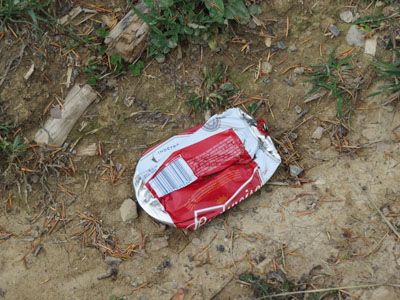 It is no secret that the National Park Service (NPS) is choked for funds. In its efforts to raise revenue, the service has struck a deal with Budweiser, allowing branded signs and sponsorships—an effort that a large coalition of public health, industry watchdog, and substance use prevention organizations condemned as “a mistake that should not be repeated.”
It is no secret that the National Park Service (NPS) is choked for funds. In its efforts to raise revenue, the service has struck a deal with Budweiser, allowing branded signs and sponsorships—an effort that a large coalition of public health, industry watchdog, and substance use prevention organizations condemned as “a mistake that should not be repeated.”
Public Citizen and the Campaign for a Commercial-Free Childhood led the group to co-sign an October 27th letter criticizing the partnership with megabrewer AB Inbev, makers of Budweiser. The group warns that alcohol branding in public parks will “encourage underage drinking and damage the reputation of national parks as safe spaces for children and families.”
The branding agreement was the brainchild of NPS Director Jonathan Jarvis. For almost 20 years, the service has adhered to Director’s Order 21, which prohibited donations from any product or company that would “reflect adversely on the NPS mission and image, such as alcohol or tobacco products.” However, last year, Jarvis led the Service to sign a $2.5 million deal with AB Inbev, allowing the brewer to use NPS icons such as the Statue of Liberty and promote Bud-branded events within the parks themselves. According to the Denver Post, Jarvis heralded the deal as “aligning the economic and historical legacies of two iconic brands.”
Jeff Ruch, executive director of Public Employees for Environmental Responsibility, dismissed the deal as accommodation to corporate interests. “This deal isn’t a slippery slope,” he told the Post. “It’s a bungy jump.”
Budweiser joins several other alcohol producers in seeking to align themselves with active, outdoor lifestyles. However, a brand as large as Budweiser has associated itself with many other things, most which the NPS should be reluctant to sign off on: stock cars; sexist iconography and language suggestive of sexual assault; and, notably, youth alcohol use. Bud and Bud Light alone may account for 20% of underage binge drinking.
Importantly, alcohol companies have a documented history of using social responsibility and philanthropy to both whitewash their image and reach new markets. NPS should not be an accessory to this. Alcohol Justice is proud to be a co-signee on the letter, and calls on Director Jarvis to restore the integrity of Director’s Order 21—preserving our parks as a refuge from corporate interests, alcohol advertising, and youth exposure to an all-too-pervasive public health threat.
TAKE ACTION: sign the petition to Respect Our Parks.
READ MORE from Public Citizen.
FULL TEXT of the letter to the National Park Service.
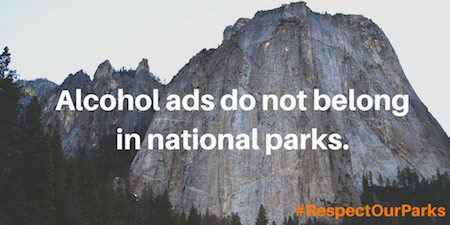
Binge Pink: Keeping Alcohol Away from Breast Cancer Charities
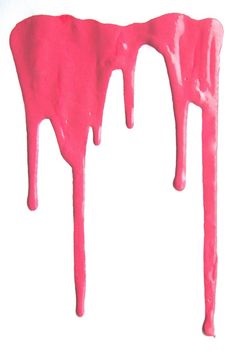 Breast cancer threatens the health of millions of women worldwide, and the pink ribbon is widely recognized as a symbol of hope, awareness, and action. This has resulted in an “all hands on deck” mentality, where any offer of support is welcome as part of charity events and campaigns. Many fundraising events, however, rely on alcohol as an inducement (or even raison d’etre) despite the substantial role drinking plays in exacerbated the risk of breast cancer.
Breast cancer threatens the health of millions of women worldwide, and the pink ribbon is widely recognized as a symbol of hope, awareness, and action. This has resulted in an “all hands on deck” mentality, where any offer of support is welcome as part of charity events and campaigns. Many fundraising events, however, rely on alcohol as an inducement (or even raison d’etre) despite the substantial role drinking plays in exacerbated the risk of breast cancer.
Although the events themselves have their hearts in the right place, the alcohol industry's eager participation creates real problems. San Francisco-based watchdog group Breast Cancer Action has coined the term "pinkwashing" to describe a company or organization that claims to care about breast cancer by promoting a pink ribbon product, but at the same time sells products that are linked to the disease. “Any company can put a pink ribbon on its products," said Karuna Jaggar, Executive Director of Breast Cancer Action. "The widely recognized pink ribbon symbol is not regulated by any agency and does not necessarily mean it effectively combats the breast cancer epidemic. In fact, many companies sell pink ribbon products that are linked to increased risk of breast cancer.”
Alcohol Justice has already detailed the industry's widespread complicity in pinkwashing tactics, wherein companies use breast cancer awareness to receive significant marketing exposure, celebrate alcohol use, and directly target their products at young women—heedless of the carcinogenic consequences of drinking. These problems are compounded when the alcohol industry sponsors, piggybacks on, or serves as the focus of other organizations' pink ribbon events. Through in-kind donations, open bars, drinking festivals, and other forms of sponsorship, alcohol companies don’t just promote their product, they promote the idea that greater consumption is a social good regardless of the cancer-causing effects of frequent drinking.
"Cancer charities need to reconsider any marketing partnerships and sponsorship relationships with alcohol brands," said Alcohol Justice Executive Director/CEO Bruce Lee Livingston. "It's exploitative and disrespectful for these brands to benefit in sales and exposure when they are making the problem worse."
According to the American Cancer Society, women who have two or more drinks per day have a 50% increase in their risk of breast cancer. For attendees to justify the admission price for beer festivals and open bar events—which can run $50 or more—they will have to consume much more than two drinks.
As the pink ribbon becomes more and more prevalent in the philanthropic landscape, it creates more potential for these kinds of self-defeating actions. Breast Cancer Action established the Think Before You Pink website to provide guidelines for evaluating breast cancer charities, partners, and events. Among other axioms, they advise consumers to ask themselves, “Does this purchase put you or someone you love at risk for exposure to toxins linked to breast cancer?” With alcohol in general—and frequent or binge drinking in particular—the answer is an unqualified yes.
This is not to preclude all beer or spirits companies from engaging in social responsibility surrounding breast cancer. However, these companies need to limit themselves to unrestricted cash contributions and keep their logos out of materials linked to the causes they are supporting. Considering the messaging, the risks, and the importance of combating breast cancer, these events should celebrate life, perseverance, and hope, not binge drinking.
Mr. Livingston presented on pinkwashing as part of the 2016 Wisconsin Alcohol Policy Seminar on October 20th, 2016. The slides from his presentation are available here.
Michelob Now Claims that Beer Equals Health
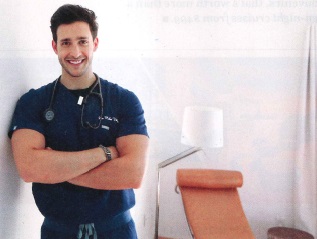 Doctor Mike likes to work out. Doctor Mike likes to throw himself into his work. Doctor Mike likes to give back to the community. And Doctor Mike likes to drink.
Doctor Mike likes to work out. Doctor Mike likes to throw himself into his work. Doctor Mike likes to give back to the community. And Doctor Mike likes to drink.
This fictional tippling physician is the creation of Michelob Ultra, a low-calorie “super-premium” beer. In a two-page ad spread in Travel & Leisure titled “All in a Day’s Work (and Play),” the doctor is shown in equal parts working out, reaching out, and letting off steam with a drink. It’s all part of megabrewer AB InBev’s plan to equate alcohol with health and exercise.
“The brand is really positioned around this active lifestyle space,” Joe Lennon, brand director for the beer, told Bloomberg Businessweek. “Our target consumer is somebody who makes a conscious effort to live that healthy, active lifestyle but still enjoys time with friends and having a few beers.”
Michelob Ultra follows a growing trend of alcohol manufacturers advertising by claiming their products can promote health, weight loss, or physical activity. These claims fly in the face of the well-studied and well-documented risks of long-term use. Chronic drinking greatly increases the risk liver disease, damage to the heart and circulatory system, multiple forms of cancers, pancreatitis, and stroke. It can also change mood and behavior—making it harder for Doctor Mike to forge the patient bonds the ad says he values, or to deliver a persuasive pitch to raise funds for his charities.
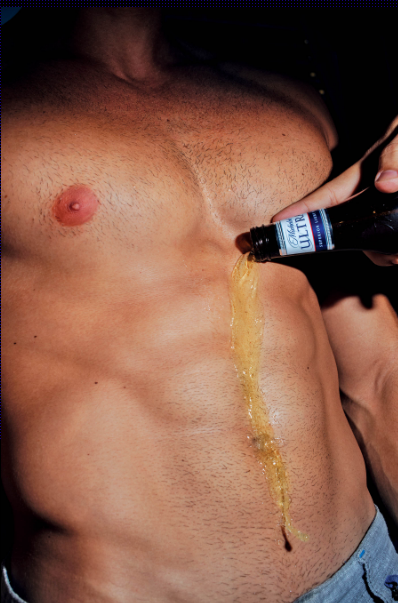
Michelob’s reckless resident also conveniently ignores alcohol’s short-term effects on his own athletic performance. A review in Nutrients detailing the effects of alcohol during and after exercise explained that alcohol in the body disrupts metabolism and protein synthesis, preventing the body from recharging its energy stores and rebuilding muscles. (The authors also note that alcohol itself is treated as an energy source by the body—no matter how “lite” the beer, alcohol is calories.) But athletes don't need to have to look at biochemistry to see the oxymoron within the idea of an "athletic lifestyle" brew. The NCAA distributes educational materials warning of alcohol’s propensity to derail training, citing:
- Dehydration and accelerated fatigue
- Loss of motor skills and strength for up to 72 hours after use
- Increased body fat
- Nutrient deficiencies
- Compromised immune system and delayed healing
- Sleep disruption
All of the above are major impediments to reaching peak athletic form—and in some cases, to simply being happy day-to-day.
With all that in mind, AB InBev’s offers to let its customers (per Bloomberg) “[paddleboard out and] board the Miami party boat in June, jog through New York City in July, or climb a beachside cliff in Southern California in August” are just offers to lose the benefits of their hard work—and in the long run, maybe suffer worse consequences. After all, having graduated medical school, Doctor Mike should already know that physicians fall victim to alcohol disorders just as often as the rest of us.
FURTHER READING: Outside magazine on drinking and exercise.
Torso photo by Eva O'Leary for Bloomberg Businessweek.
More Articles ...
Help us hold Big Alcohol accountable for the harm its products cause.
| GET ACTION ALERTS AND eNEWS |
STAY CONNECTED    |
CONTACT US 24 Belvedere St. San Rafael, CA 94901 415-456-5692 |
SUPPORT US Terms of Service & Privacy Policy |


